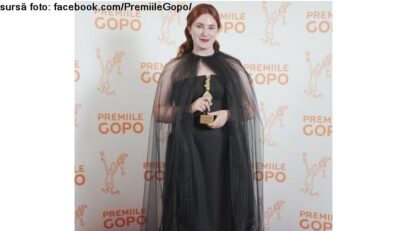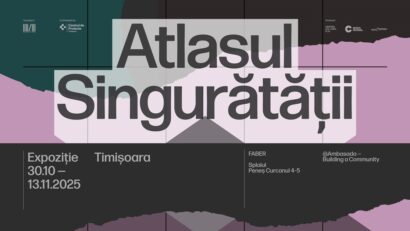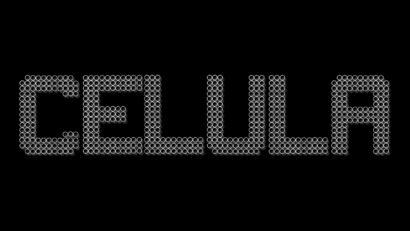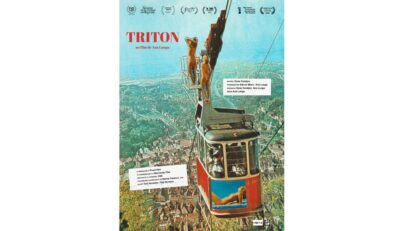Alina Grigore, recipient of the Golden Shell Award at SSIFF
Alina Grigore's debut feature, Blue Moon, won the Golden Shell for best film at the International Film Festival in San Sebastian (SSIFF)
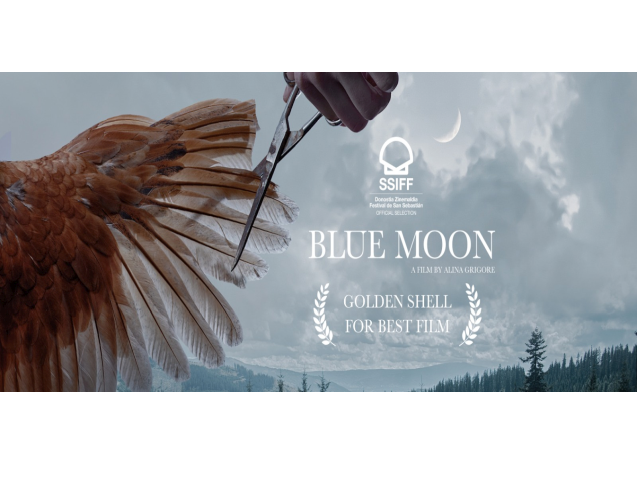
Corina Sabău, 15.01.2022, 14:00
Alina Grigore’s
debut feature, Blue Moon, last year scooped the Golden Shell award for best
film at the International Film Festival in San Sebastian (SSIFF), Spain, one of
the most prestigious events of its kind in Europe. Blue Moon was written and
directed by Alina Grigore and features Ioana Chițu, Mircea Postelnicu, Mircea
Silaghi and Vlad Ivanov in its cast. The script draws on Alina Grigore’s
personal experience, who spent part of her childhood in a village in Neamț
County. Girls my age in particular were given no chance of developing. The physical
and psychological abuses we endured were commonplace in our village, Alina
Grigore recalls.
Blue Moon tells the story of Irina, a young girl who wants
to leave her dysfunctional family and dreams of studying in the capital city,
yet fails, plagued by the violence surrounding her. The main prize in the San
Sebastian competition went to a low-budget film produced by a very passionate group
of filmmakers at the National Center for Cinematography. We spoke to Alina
Grigore about the prize she won, how she managed to turn her own experience
into a film and about her unusual behind-the-scenes work ethic.
I used to
live in the countryside for a while. I was seven when I left Bucharest to live
in a village in Neamț County,
and it was quite the culture shock for me. Moving felt even more shocking since
I was very young and used to living in a different kind of community. So I
started penning a diary of everything that happened, and I continued writing about
it even later, when I revisited my diary. First of all, parents had no interest
in educating their children, because their top concern was surviving. Children
were encouraged to either stay and take care of the household or seek work abroad.
I recall one time when I went home to do my homework, and my best friend was
going home too to work the land. This was back in the first or second grade, in
the 90s. Unfortunately, things haven’t changed much ever since. Children
in the rural area are not encouraged to continue their studies. Inspired by
everything I’d seen, I started writing the book I hope to publish one day. We
produced this film using the InLight acting school method, meaning we come up
with an idea and everyone pitches in to develop it. Once I wrote the script, it
was a sustained effort, which required talking to the actors about their
characters and cut-scenes, with the image director and editor. That’s how we
started to discover what actually drives our characters.
The director of the film Blue Moon told us more
about the use of the InLight acting technique, which also gave the name of an
acting school founded by Alina Grigore together with a team of artists:
The novelty
about InLight is that we focus on collaboration with the actors and other
members of the team. In other words, we encourage everyone in the team to say
how they see things, we talk to the director of photography, to the editor, we
analyse the script and we discuss the characters and situations. In my opinion,
it is quite captivating. We put together character descriptions, we come up
with suggestions, we improvise. As far as the plot goes, we have looked for and
found common memories-and given that the topic is family, it is impossible not
to find things in common. And all this research, all this background work is
very helpful for actors. It is a great help, when you are on the set, to
discover things you have in common with others, to know the motivations of your
partner in that particular scene. This is one aspect. Secondly, I was
interested in what the actors think about the script, how they approach it. For
me, this kind of collaborative work is very important. When a text is
translated, I am even interested in what the translator thinks about the text,
so obviously the suggestions coming from the actors and the rest of the team
are very important for me. I think collaboration is more efficient because,
when you allow the others to explore, they reach a higher level of creativity,
which is useful to you as a director because you can benefit from this
creativity. In contrast, if you are the kind of director who only coordinates,
there is not much communication. So, this is what InLight is all about:
collaboration. And if you trust this kind of approach, it is my belief that you
invite more emotion, especially in character building. And finally, you have a
happier team, where each member knows they can express themselves freely, although
obviously within some limits. There were several scenes where the actors were
absolutely free, and I’m thinking especially about a scene with Mircea
Postelnicu and Ioana Chițu, which everybody said came out like a dance, like a
tango between the director of photography, the director and the actors. And this
is exactly what I want-I want making a film to be like a dance with the others.
Until Blue Moon, director Alina Grigore was mostly
known as an actress. She played in several series and in the feature film Illegitime
directed by Adrian Sitaru, for which she was also the screenwriter. (tr. V. Palcu, A.M. Popescu)

